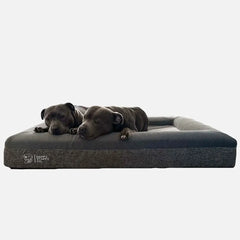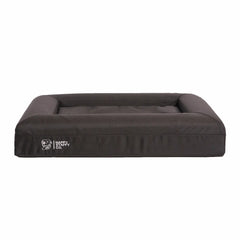As pet owners, we want nothing but the best for our furry companions. From their food to their toys, every choice we make reflects how much we care. Mealtime is no exception, and the bowl you select plays a bigger role than you might think. Stainless steel dog bowls have become a trusted favorite for their practicality and safety, offering a clean, durable, and reliable option for pets of all sizes. It’s not just about feeding your dog—it’s about showing them how much they mean to you.
Think about those wagging tails and eager eyes as they wait for their meal. The right bowl ensures that every bite is safe, fresh, and enjoyable. Stainless steel bowls resist bacteria, scratches, and wear, making them a perfect choice for even the most enthusiastic eaters. Whether you’re raising a rambunctious puppy or cherishing an older dog, stainless steel bowls are designed to support their health and happiness, day after day.
Key Takeaways:
-
Stainless steel dog bowls are durable, hygienic, and long-lasting, making them ideal for all dog breeds, life stages, and feeding styles. Their resistance to rust, scratches, and bacteria makes them a superior choice over plastic or ceramic alternatives.
-
Non-porous, chemical-free, and hypoallergenic by nature, stainless steel helps reduce the risk of contamination, mold growth, and allergic reactions—making it a safe choice for dogs with sensitivities or weakened immune systems.
-
Practical features like anti-slip bases, dishwasher safety, and chew resistance make stainless steel bowls convenient for both pets and pet owners. These features help minimise spills and simplify cleaning.
-
Choosing the right bowl involves evaluating your dog’s eating habits, breed-specific traits, and any health considerations. From slow-feeders for fast eaters to elevated options for tall or arthritic dogs, stainless steel bowls come in designs that meet diverse needs.
-
Stainless steel bowls are eco-friendly and cost-effective, offering long-term value through their recyclability and durability, which helps reduce waste and replacement costs over time.

Benefits of Using Stainless Steel Dog Bowls
Unmatched Durability
Stainless steel dog bowls are built to withstand years of use, even with rough handling by active or playful dogs. Unlike other materials, they resist cracking, chipping, or breaking, ensuring long-term reliability.
Chew and Scratch Resistance
For dogs that love to chew or paw at their bowls, stainless steel provides a tough, chew-proof, and scratch-resistant option that maintains its functionality and appearance over time.
Hygienic and Non-Porous
The smooth, non-porous surface prevents bacteria and mold from accumulating in tiny crevices. This feature ensures that your dog’s meals remain uncontaminated and safe to eat.
Odor-Free and Stain-Resistant
Unlike plastic, stainless steel does not retain odors or develop unsightly stains, keeping every meal fresh and appetising for your pet. This is especially beneficial for wet or strong-smelling foods.
Eco-Friendly and Sustainable
Stainless steel is 100% recyclable, making it a sustainable choice for environmentally conscious pet owners. By choosing this material, you contribute to reducing waste and promoting eco-friendly practices.
Suitable for All Types of Food and Water
Versatility is a key advantage of stainless steel bowls, as they work equally well for holding dry kibble, wet food, or water without degrading or absorbing moisture.
Low Maintenance and Easy Cleaning
Cleaning is quick and effortless, thanks to the smooth surface that resists food sticking. Most stainless steel bowls are dishwasher-safe, further simplifying their upkeep.
Safe and Chemical-Free
Free from harmful chemicals such as BPA or phthalates often found in plastic bowls, stainless steel ensures your pet’s health is protected during mealtime.
Allergy-Friendly
Hypoallergenic properties make stainless steel a safe choice for dogs with sensitivities or allergies to other materials like plastic.
A Cost-Effective Investment
While initially more expensive than plastic options, stainless steel bowls pay off in the long run due to their durability and minimal replacement needs.
Resistant to Environmental Factors
Stainless steel bowls are resistant to rust, corrosion, and temperature changes, making them suitable for both indoor and outdoor use. They remain unaffected by extreme heat or cold, maintaining their quality in all conditions.
Sturdy and Spill-Proof Design
The weight of stainless steel bowls helps prevent tipping and spills during mealtime, especially for energetic dogs. Many also feature anti-slip bases for added stability.
Visually Appealing and Versatile Designs
Available in sleek, minimalist designs or with added features like anti-slip rubber bases, stainless steel bowls complement a variety of home aesthetics while remaining functional.
Hygienic Feeding Solution for Multi-Pet Homes
In households with multiple pets, stainless steel bowls are easier to sanitise and maintain, reducing cross-contamination and ensuring a clean environment for all.
Health Benefits of Stainless Steel Bowls for Your Dog
Chemical-Free and Safe
Stainless steel bowls are free from harmful chemicals like BPA and phthalates, which are commonly found in plastic alternatives. This ensures your dog’s meals are safe and free from potential toxins.
Reduces Risk of Contamination
The smooth, non-porous surface prevents food particles and bacteria from lodging in crevices, minimising the risk of contamination and maintaining a hygienic feeding environment.
Hypoallergenic Material
Dogs with allergies or sensitivities to other materials benefit from stainless steel’s hypoallergenic properties, reducing the risk of skin irritation or adverse reactions.
Odor and Stain Resistance
Stainless steel does not retain odors or stains, ensuring meals remain fresh and free from lingering smells or discoloration.
Prevents Mold and Bacteria Growth
Non-porous surfaces make it difficult for mold, bacteria, or fungi to develop, contributing to your dog’s overall health and well-being.
Supports Fresh and Clean Meals
The ability to clean stainless steel thoroughly ensures your dog’s meals are free from residue and contaminants, keeping their food as fresh as possible.
Who Should Use Stainless Steel Dog Bowls?

First-Time Pet Owners
New pet owners benefit from the durability and hygiene offered by stainless steel bowls, ensuring long-term reliability.
Owners of Multiple Dogs
Families with multiple pets can maintain a clean and hygienic feeding environment, as stainless steel bowls are easy to sanitise.
Dogs with Allergies or Sensitivities
Pets prone to allergies, or sensitivities to plastic or other materials, thrive with the chemical-free and hypoallergenic nature of stainless steel.
Active or Energetic Dogs
Dogs that tend to knock over lightweight bowls benefit from the sturdy construction of stainless steel, which helps prevent spills.
Pet Owners Seeking Low Maintenance
Stainless steel bowls are ideal for those looking for easy-to-clean, dishwasher-safe options that require minimal upkeep.
Environmentally Conscious Owners
Those seeking a sustainable and eco-friendly feeding option can rely on stainless steel for its recyclability and longevity.
How to Select the Right Dog Food Bowl
Choosing the ideal dog food bowl goes beyond size—it’s about matching your pet’s needs with the bowl’s functionality and features. Evaluating your dog’s eating habits, physical traits, and feeding preferences ensures a practical and effective solution.
Evaluate Feeding Habits
Dogs have unique eating behaviours that can influence the choice of bowl. For fast eaters, slow-feed bowls are a great option to encourage slower consumption, promoting healthy digestion and reducing the risk of bloating. Grazers, on the other hand, do well with standard bowls that allow them to nibble at their leisure without interruption.
Consider Bowl Shape for Physical Traits
The shape of a dog food bowl plays a significant role in your pet’s comfort during mealtime. Long-eared breeds benefit from narrow bowls that prevent their ears from dipping into food or water. For flat-faced breeds, wide, shallow bowls offer better access, allowing them to eat comfortably without straining.
Look for Practical Features
Key features such as anti-slip bases help keep the bowl in place during feeding, minimising messes. Chew-proof designs are ideal for dogs that tend to play with or chew on their bowls. If your pet requires elevated feeding, consider bowls compatible with stands to make mealtime more ergonomic and accessible.
Focus on Durability and Safety
A high-quality stainless steel bowl ensures long-term use while providing a safe, non-toxic feeding surface. Stainless steel is hygienic, easy to clean, and resistant to bacteria buildup, making it a reliable choice for every dog. These bowls are also dishwasher-safe, adding convenience to their maintenance.
Simplify Mealtime with Versatile Options
A well-designed stainless steel bowl suits various feeding scenarios, whether you’re serving dry kibble, wet food, or water. Its versatility eliminates the need for multiple bowls, making it a practical all-in-one solution for your pet’s feeding routine.
By focusing on your dog’s eating habits, physical traits, and practical features, a single-size stainless steel bowl can meet diverse needs effectively while ensuring a comfortable and hygienic mealtime experience.
How to Clean and Maintain Stainless Steel Dog Bowls
Maintaining stainless steel dog bowls is a simple process, but consistency is key to ensuring your pet has a clean and hygienic feeding environment. After every meal, rinse the bowl thoroughly with warm water to remove food particles and residue. Use a mild, pet-safe soap to wash the surface, scrubbing gently with a soft sponge or cloth. Avoid harsh cleaning agents or abrasive pads, as these can scratch the bowl's surface, making it more susceptible to bacteria buildup over time.
For deeper cleaning, soak the bowl in a mixture of warm water and natural cleaning agents like vinegar or baking soda. This method not only eliminates stubborn stains but also helps restore the bowl’s original shine. To prevent rust, always dry the bowl completely before refilling it with food or water. For households with multiple pets, it's a good practice to sanitise bowls weekly by running them through a dishwasher, provided they are labeled as dishwasher-safe. Regular cleaning not only maintains the bowl’s appearance but also ensures your dog’s meals remain fresh and safe.
Key Features to Look for in Stainless Steel Dog Bowls
Stainless steel dog bowls come with a variety of features designed to cater to specific needs, so understanding what to look for can help you make the best choice. For dogs that tend to push or knock over their bowls during mealtime, an anti-slip base made of rubber or silicone is a must-have. These bases provide stability and minimise messes. If your dog is a heavy chewer or tends to be rough with their feeding equipment, opt for chew-proof and scratch-resistant designs that can handle wear and tear.
Convenience is another important factor. Dishwasher-safe bowls make cleaning effortless, saving time for busy pet owners. For dogs that require elevated feeding solutions—such as larger breeds or those with joint issues—select bowls that are compatible with stands or come as part of an elevated feeding set. Slow-feed bowls, like the Octopaws Slow Feeder, are excellent for pets that eat too quickly, promoting healthier digestion and reducing the risk of bloating.
Additionally, a water bowl such as the Water Bowl, is ideal for dogs that drink frequently or for multi-pet households. High-quality bowls also offer a seamless, polished finish that prevents bacteria buildup and maintains hygiene. By focusing on these key features, you can ensure your dog has a functional, durable, and safe feeding solution.
Choosing the Best Dog Bowl for Your Pet

Selecting the right stainless steel dog bowl involves evaluating your pet’s specific needs and behaviours. Elevated bowls can greatly benefit taller dogs or those with mobility issues by improving posture and making mealtime more comfortable. For dogs that eat too fast, consider slow-feed designs like the Octopaws Slow Feeder, which encourage slower eating and reduce the risk of digestive problems.
When choosing a bowl, durability should always be a factor. Look for reputable brands known for producing reliable, pet-safe stainless steel options. For example, our Happy Staffy Bowl combines practicality with a sleek design, making it both functional and visually appealing. Lastly, consider how the bowl fits into your home. A well-designed stainless steel bowl not only caters to your dog’s needs but also complements your living space with its polished finish and thoughtful features.
Common Questions About Stainless Steel Dog Bowls
Are stainless steel bowls good for dogs?
Yes, stainless steel bowls are excellent for dogs. They are durable, non-porous, and easy to clean, which helps maintain a hygienic feeding environment. Unlike plastic or ceramic bowls, stainless steel resists scratches and bacteria buildup, making it a safe and long-lasting choice for your pet.
Why won't my dog drink water from a stainless steel bowl?
Some dogs may hesitate to drink from a stainless steel bowl due to reflections or noises created by the metal. The shiny surface can sometimes reflect light, which might confuse or startle your dog. Additionally, a strong smell of soap or detergent left after cleaning may deter them, so always rinse thoroughly after washing.
Can dogs have a reaction to stainless steel?
Allergic reactions to stainless steel are extremely rare but not impossible. Some dogs with metal sensitivities may experience irritation if the bowl contains trace amounts of nickel. To avoid this, opt for high-quality stainless steel bowls labeled as food-grade or nickel-free.
How do you disinfect stainless steel dog bowls?
Disinfect stainless steel dog bowls by soaking them in a mixture of warm water and white vinegar or a pet-safe disinfectant. After soaking for 10–15 minutes, scrub with a soft sponge, rinse thoroughly, and dry completely. For convenience, dishwasher-safe bowls can be sanitised in the dishwasher.
Why won't my dog eat out of a stainless steel bowl?
A dog may refuse to eat from a stainless steel bowl if they are sensitive to the bowl’s smell, reflections, or sounds. It could also be due to an unfamiliar or uncomfortable feeding setup. Try placing the bowl on a non-slip mat or ensuring it’s free from strong soap odors to encourage use.
Is it bad for dogs to drink out of stainless steel?
No, it’s not bad for dogs to drink out of stainless steel bowls. In fact, stainless steel is one of the safest materials for dog bowls because it doesn’t leach chemicals, harbor bacteria, or retain odors. Ensure regular cleaning to maintain hygiene.
What is the healthiest material for a dog bowl?
Stainless steel is widely regarded as the healthiest material for dog bowls. It is durable, non-toxic, easy to clean, and resistant to bacteria buildup. Other options like ceramic and glass can also be safe, but they are prone to chipping and require more careful maintenance.




